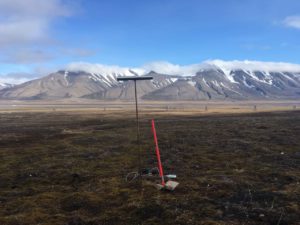Mosses play an important role in insulating the soil from increasing air temperatures, reducing the impact on the permafrost. As a result of increasing temperatures and precipitation, the vegetation composition in the Arctic is changing. This shift will likely impact the active layer and permafrost underneath, which could lead to a change in the release of greenhouse gases. More information on the impact of individual species is needed to accurately predict the coming changes in the Arctic
Project description:
 The aim of this project is to reveal the differences in insulating capacity of various moss species and which traits play a major role in insulation of the soil.
The aim of this project is to reveal the differences in insulating capacity of various moss species and which traits play a major role in insulation of the soil.
The student will join an on-going PhD project. You will assist with field work. Depending on when you join, this can entail several tasks.
In June, monocultures of various moss species will be placed on the tundra. During summer (June – August) we will monitor soil temperatures, soil moisture and development of active layer depth. Polar bear watch will also be a part of field work
The project involves:
Fieldwork
Starting date/period:
from 1. June 2021 – 30. September 2021
Prerequisites:
Able to carry and handle a rifle. Basic knowledge in ecology.
Experience/skills to be acquired:
The student will gain some knowledge on bryophyte species as well as how to conduct abiotic measurements in the field. The student will also learn how to operate in a high Arctic environment where polar bears can be present.
Involvement:
Flexible (max 40h). It is recommended to work at least 7 h/day when being in the field.
Interested by this project? Need more info? Contact:
Simone Lang
Project number: 17
